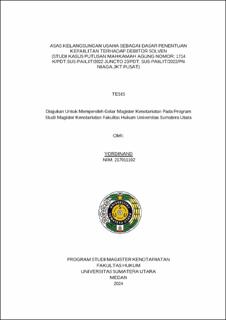| dc.contributor.advisor | Purba, Hasim | |
| dc.contributor.advisor | Sembiring, Rosnidar | |
| dc.contributor.advisor | Harianto, Dedi | |
| dc.contributor.author | Yordinand, Yordinand | |
| dc.date.accessioned | 2024-11-12T06:13:28Z | |
| dc.date.available | 2024-11-12T06:13:28Z | |
| dc.date.issued | 2024 | |
| dc.identifier.uri | https://repositori.usu.ac.id/handle/123456789/98727 | |
| dc.description.abstract | Bankruptcy law in Indonesia is governed by Law Number 37 of 2004 concerning Bankruptcy and Suspension of Debt Payment Obligations. This law offers two alternative legal options: bankruptcy petition and PKPU petition. Given the significant impact of bankruptcy on debtors, a bankruptcy ruling must align with the going concern principle and be considered as a last resort in law enforcement. The research problems addressed in this study are:
1. The parameters of the going concern principle as a basis for bankrupting solvent debtors according to Law Number 37 of 2004 concerning Bankruptcy and Suspension of Debt Payment Obligations. 2. The concept of the going concern principle as legal protection for solvent debtors in relation to the fulfillment of the simple proof principle in bankruptcy proceedings. 3. Analysis of judicial considerations and decisions related to the application of the going concern principle as a basis for determining solvent debtors in the Supreme Court Decision Number 1714K/Pdt.Sus-Pailit/2022 Juncto 23/Pdt.Sus-Pailit/2022/PN. Niaga.Jkt. Pusat.
The method used in this research is normative juridical research with a descriptive-analytical approach. The types of data used are secondary data consisting of primary, secondary, and tertiary legal materials. Data collection techniques include literature review and interviews. The data obtained were then qualitatively analyzed to produce descriptive-analytical writing.
Based on the judges' considerations referring to Article 8 Paragraph (6) of the Bankruptcy Law, considering that there are still simple lawsuit procedures that also apply simple proof and a short examination period that can be pursued by the Petitioner as an alternative in filing claims. Although the petition in question proved to be simple, the Panel of Judges decided to reject the Petitioner's application. The Panel of Judges in Decision Number 1714K/Pdt.Sus- Pailit/2022 Juncto 23/Pdt.Sus-Pailit/2022/PN.Niaga.Jkt. Pusat applied the going concern principle, as the Respondent was still solvent and the Respondent's debts were relatively small, so bankrupting the Respondent would terminate its productive business. | en_US |
| dc.language.iso | id | en_US |
| dc.publisher | Universitas Sumatera Utara | en_US |
| dc.subject | Bankruptcy | en_US |
| dc.subject | Going Concern Principle | en_US |
| dc.subject | Solvent | en_US |
| dc.title | Asas Kelangsungan Usaha sebagai Dasar Penentuan Kepailitan terhadap Debitor Solven (Studi Kasus Putusan Mahkamah Agung Nomor: 1714 K/PDT.SUS-PAILIT/2022 Juncto 23/PDT. SUS-PAILIT/2022/PN NIAGA.JKT.PUSAT) | en_US |
| dc.title.alternative | Principle of Going Concern as a Basis for Determining Bankruptcy for Solvent Debtors(Case Study of Supreme Court Decision Number: 1714 K/PDT.SUS-PAILIT/2022 Juncto 23/PDT. SUS-PAILIT/2022/PNNIAGA.JKT.PUSAT) | en_US |
| dc.type | Thesis | en_US |
| dc.identifier.nim | NIM217011102 | |
| dc.identifier.nidn | NIDN0003036602 | |
| dc.identifier.nidn | NIDN0002026602 | |
| dc.identifier.nidn | NIDN0020086905 | |
| dc.identifier.kodeprodi | KODEPRODI74102#Kenotariatan | |
| dc.description.pages | 144 Pages | en_US |
| dc.description.type | Tesis Magister | en_US |
| dc.subject.sdgs | SDGs 16. Peace, Justice And Strong Institutions | en_US |


